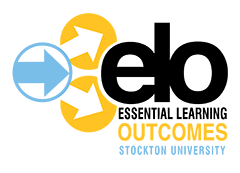Essential Learning Outcomes for Mathematics
 Stockton University’s 10 Essential Learning Outcomes (ELOs) combine Stockton’s flexible andStockton's ELO logo distinctive liberal arts education
with real-world, practical skills. They guide all Stockton University students from
first-year through graduation to the intellectual and marketable talents needed to
prepare for personal and professional success in the 21st century. As a set of values
shared by everyone in the campus community, students encounter opportunities to develop
ELOs in all Stockton majors, career preparation, professional experiences both on
and off-campus, and academic as well as social activities.
Stockton University’s 10 Essential Learning Outcomes (ELOs) combine Stockton’s flexible andStockton's ELO logo distinctive liberal arts education
with real-world, practical skills. They guide all Stockton University students from
first-year through graduation to the intellectual and marketable talents needed to
prepare for personal and professional success in the 21st century. As a set of values
shared by everyone in the campus community, students encounter opportunities to develop
ELOs in all Stockton majors, career preparation, professional experiences both on
and off-campus, and academic as well as social activities.
Program excellence
Students should:
Demonstrate mastery of a range of Mathematical skills spanning foundational concepts to advanced topics of study; engage in mathematical inquiry as a tool for self directed study; possess an understanding of contemporary mathematical topics and modern mathematicians; recognize and appreciate the interdisciplinary aspects of mathematics and the interrelations of mathematical topics.
Critical Thinking
Students should:
Develop the reasoning skills to construct valid arguments and judge the validity of arguments; take abstract thoughts and turns them into effective, workable solutions; be skilled in the mathematical process: define problems, uncover relevant patterns, form conjectures, and engage in formal proof techniques; use reflection as a tool for understanding the depth of a problem and reassess the approach or redefine the problem relevant to this reflection.
Quantitative Reasoning
Students should:
Possess the mathematical expertise required to apply quantitative knowledge, including the technological skills required for computation, the theoretical knowledge needed to understand applications, and maturity as a problem solver; recognize that reflection is part of the reasoning process; recognize the applications of mathematics to a wide range of disciplines and in non-traditional situations.
Communication Skills
Students should:
Possess the skills to make clear mathematical arguments in the form of oral and written communication; be able to present a valid argument using formal proof techniques; express mathematical arguments in an accurate and formal manner with the understanding that a systematic approach to a problem must be represented systematically in the presentation of the solution.
Creativity and Innovation
Students should:
Recognize that creativity and innovation are important in problem solving; be able to approach a problem from different directions including non-traditional methodology; generate connections between seemingly unrelated concepts; be able to use "positive failures" as a guide to finding alternate approaches; be able to transfer mathematical methodology to solve a wide range of problems.


